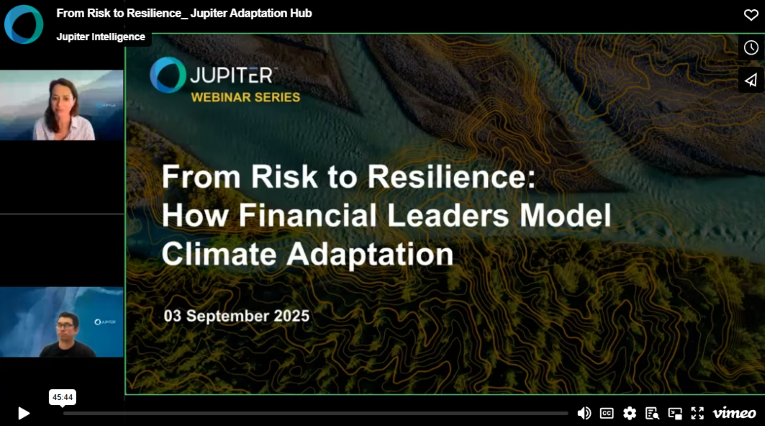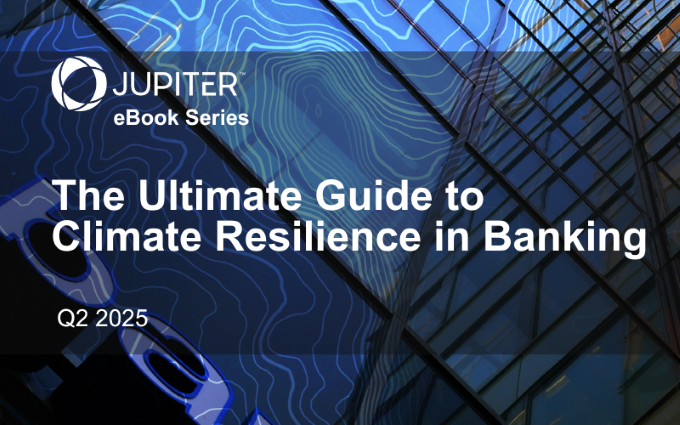Toward a new understanding of quantifying climate risk

Featured


[ON-DEMAND WEBINAR] From Risk to Resilience: How Financial Leaders Model Climate Adaptation
See how Jupiter empowers banks, asset managers, and private equity firms to integrate climate adaptation and resilience into capital planning, portfolio strategy, and investment decisions. For financial institutions, climate risk is now a core business risk. To safeguard portfolios and deliver long-term value, leaders must move beyond risk awareness toward actionable climate adaptation.

.png)
A Buyers Guide to Evaluating Physical Climate Risk Data
This Buyers Guide offers a structured, nine‑point evaluation framework to assess climate‑risk data beyond mere dashboards. It helps organizations connect climate insights directly to financial outcomes, evaluate adaptation modeling ROI, and ensure data integrity for auditors, regulators, and boards—mitigating mispriced assets, stranded investments, and compliance risks.


Infratil: Climate Related Disclosure 2025
Read about Jupiter's climate analytics featured in Infratil's latest Climate Related Disclosures report and how Jupiter ClimateScore Global platform helped assess physical climate risks across 323 assets in Infratil's diverse infrastructure portfolio. By turning climate science into actionable data, Jupiter is empowering organizations to build resilience in a changing climate.
Overviews
Use Cases

Corporate Risk Management Use Case

Transportation and Linear Assets Use Case
.png)
Agriculture Use Case
Agriculture Use Case

CSRD Module Datasheet
Publications
.png)
A Buyers Guide to Evaluating Physical Climate Risk Data
This Buyers Guide offers a structured, nine‑point evaluation framework to assess climate‑risk data beyond mere dashboards. It helps organizations connect climate insights directly to financial outcomes, evaluate adaptation modeling ROI, and ensure data integrity for auditors, regulators, and boards—mitigating mispriced assets, stranded investments, and compliance risks.

Infratil: Climate Related Disclosure 2025
Read about Jupiter's climate analytics featured in Infratil's latest Climate Related Disclosures report and how Jupiter ClimateScore Global platform helped assess physical climate risks across 323 assets in Infratil's diverse infrastructure portfolio. By turning climate science into actionable data, Jupiter is empowering organizations to build resilience in a changing climate.
.png)
Climate Risk: Logistics and Industrial Outlook
Cushman & Wakefield’s latest report delivers the most comprehensive global analysis of physical climate risk for the logistics and industrial (L&I) real estate sector. Powered by Jupiter’s ClimateScore™ Global data, the report examines current and future climate exposures across 7,300 buildings in 306 submarkets and 120 cities. From floods in Chicago to heat stress in Singapore, the findings underscore why climate risk must be integrated into every stage of the investment lifecycle—from acquisition to asset management.

[eBook] The Ultimate Guide to Climate Resilience in Banking
“The Ultimate Guide to Climate Resilience in Banking” is a powerful decision-making guide developed to help banks and financial institutions evaluate their current climate risk approach and learn how to build a better one. This 28-page eBook draws from Jupiter's experience working with 25% of the largest financial institutions in the world, including 3 of the top 5 US banks, as they rise to the challenge of understanding, managing, and disclosing the impact of climate change and its associated risks.

The Climate Bubble housing report
Jupiter’s NEW report reveals the $389B climate bubble in the U.S. Housing Market. “The Climate Bubble” uncovers how climate risk is driving the recent surge in home insurance premiums while remaining dramatically underpriced in housing valuations—creating a market bubble that threatens economic stability. This isn't just an insurance problem. It's a potential threat to the stability of the entire housing market and the financial systems that depend on it. Download the report to discover how climate risk is reshaping property values and what organizations can do to prepare.

Building Resilience by Integrating Climate Risk Into Investment Planning
Co-authored by Sébastien Burgess, Senior Principal Solutions Architect at Jupiter, this study examines climate-related risks to European energy infrastructure, highlighting the importance of asset-level evaluation and customized solutions.

[eBOOK] Answering Today’s CSRD Challenge
Uncertain about how to put your company’s best foot forward to comply with the CSRD? Jupiter, the gold standard in global physical climate risk analysis, puts it all together in this comprehensive eBook. Data, tools and guidance to simplify and accelerate your compliance efforts

The role of climate and population change in global flood exposure and vulnerability
In this study, published in Nature Communications, Jupiter scientists examine how climate change is shaping global flood risks and the populations most exposed—now and in the future. Key findings reveal that by 2100, global flood exposure is projected to rise from 1.6 to 1.9 billion people. The study highlights the growing flood risks, the urgent need for climate action, and the importance of prioritizing vulnerable communities through long-term resilience planning.

[eBOOK] The Ultimate Guide to Climate Risk Disclosure Regulations, Q4 2024 Edition
Get the latest up-to-date intelligence and guidance on global climate risk regulations and reporting. This edition offers updated insights and actionable strategies for organizations navigating the evolving and transformative climate risk regulations and disclosures around the globe.
.jpg)
[eBOOK] Powering CSRD Compliance for Energy and Utility Companies
Essential guide for Energy and Utility companies looking to optimize their CSRD compliance and reporting efforts. This guide is a must-read for compliance, risk, and sustainability professionals in sectors like Energy & Utilities, where complex supply chains and diverse assets amplify the challenge of managing climate risk.
%20LINKEDIN_tiny.png)
Climate Risk: Global Cities Outlook
Explore this dynamic report, published by Cushman and Wakefield, that highlights the variation in the level and type of climate-related hazard exposure in 100 global cities, and how this is forecast to change in future, across eight hazard types. Jupiter’s ClimateScore Global data was leveraged in the climate risk analysis.

JLL Future Vision: The Climate Inflection Point
Jupiter is proud to be a contributor to this critical report published as part of JLL's Future Vision -- a global research program exploring the future of real estate. The report entitled "The Climate Inflection Point: Risk, Resilience, and Adaptation" provides an action plan for owners and occupiers as the effects of climate change are set to deepen, presenting the industry with tangible and increasingly urgent material threats.

[eBOOK] Climate Intelligence: The Untapped Alpha in Private Equity's Risk Assessment
As climate change alters the fabric of our global economy, climate risk assessment emerges as an indispensable tool in the PE toolkit—a driver not just of risk management, but of alpha, the measure of an investment's active return.

Navigating the ESG IT tool landscape: How IT tools and AI help companies master the sustainability transformation
This whitepaper published by Zühlke, a global transformation and innovation partner, provides a framework for classifying, identifying, and integrating the right ESG tools for your organization to help address CSRD and other regulatory disclosures. Jupiter is featured on pages 58-59 in the Governance section under Climate Adaptation including a case study on AstraZeneca identifying and quantifying the impact of climate risk on its global assets and key suppliers.

The Business Leaders Guide to Climate Adaptation & Resilience
The Business Leaders Guide to Climate Adaptation & Resilience supports senior decision-makers and their functional teams to integrate climate adaptation and resilience into organizational strategy, governance, and operations. Developed by WBCSD, Bain & Company, and Jupiter Intelligence, with the support of leading global businesses, the guide contains nine modules, each of which includes tools, frameworks, and case studies to facilitate action across various adaptation challenges.
.jpg)
UNEP FI’s Climate Risk Landscape Report 2024
The 2024 Climate Risk Landscape Report from the United Nations Environmental Programme Finance Initiative (UNEP FI) highlights recent trends in the climate tools market and features various tools, including Jupiter's ClimateScore Global, underscoring our shared commitment to advancing sustainable finance practices in the financial sector.

Fires, Floods, and Loans: How Banks Can Deal with Increasing Climate Risks
Bain used Jupiter Intelligence’s data to assess the extent of physical risk exposure over a 30-year horizon in any country, down to individual properties in a neighborhood. Jupiter measures physical risk across eight perils: flood, precipitation, wind, heat, wildfire, hail, drought, and cold. Based on a score that synthesizes those perils, Jupiter assigns a risk intensity to the region.
%20tiny.jpg)
[eBOOK] How Climate Resilient Is Your Company?
In the eBook, The Climate Resilience Maturity Index, Jupiter Intelligence’s climate science experts provide a roadmap for becoming climate resilient and gaining a competitive advantage over the competition.
.webp)
The Danger in Relying on FEMA Flood Maps for Risk Management
.webp)
Better finance, better built environment
.webp)
Jupiter Contributes to Con Edison’s Industry-Leading Climate Risk Analysis
Jupiter Intelligence is pleased to have contributed to a recent report from Con Edison, developed in collaboration with ICF and Columbia University’s Lamont-Doherty Earth Observatory, which examined future climate-related vulnerabilities to the utility’s infrastructure and operations.
.webp)
The Value—and Many Limitations—of CORDEX-Based Climate Risk Data

Climate gentrification and the role of flood insurance
Climate gentrification and the role of flood insurance

The Right Approaches to Climate Model Downscaling

The Essential Components of the Downscaling Toolbox
The Essential Components of the Downscaling Toolbox
.webp)
A Deluge of Risk...and a Looming Crisis
.webp)
Physical Climate Risks Present Significant Risk for Utility Grid Infrastructure
How Utilities Can Harness The Value Of Next-Generation Climate Risk Analytics For Grid Planning.

Grids Turn to High-Resolution Climate Analytics as a Strategic Tool for Resiliency Planning
As climate change causes more frequent and more extreme weather events, electric utilities worldwide are collaborating with private industry, academia, and stakeholders to improve grid resiliency.
Webinars

[ON-DEMAND WEBINAR] From Risk to Resilience: How Financial Leaders Model Climate Adaptation
See how Jupiter empowers banks, asset managers, and private equity firms to integrate climate adaptation and resilience into capital planning, portfolio strategy, and investment decisions. For financial institutions, climate risk is now a core business risk. To safeguard portfolios and deliver long-term value, leaders must move beyond risk awareness toward actionable climate adaptation.
.png)
Bridging the Gap: How to Integrate Climate and Nature in Practice
In this engaging panel discussion, Elisa Seith, Senior Principal Solutions Consultant at Jupiter, joins experts from Natcap and WWF-UK to explore the critical need for integrating climate and nature strategies. Moderated by Sebastian Leape (Natcap), the conversation highlights why treating climate and nature as separate issues limits progress, the complexities of using integrated scenarios to assess risks, and how EU and UK policy landscapes are evolving to support a more holistic approach. A must-watch for organizations aiming to align sustainability goals with practical, science-based action.

UN Global Compact, Network UK Climate Adaptation & Resilience for Business
Jupiter’s Sébastien Burgess recently joined industry leaders from AstraZeneca, Diageo, and SP Energy Networks for the UN Global Compact Network UK’s climate risk webinar series. The sessions offered practical guidance on conducting climate risk assessments and developing business continuity plans aligned with various climate scenarios. Participants explored strategies to safeguard infrastructure, operations, supply chains, and workforces from climate-related hazards. The series also highlighted key considerations for assessing exposure and vulnerability to climate risks—and how leading companies are integrating these insights into strategic planning and decision-making.

[ON-DEMAND WEBINAR] 2024’s Climate Risk Regulations Wrapped: How to Prepare for 2025 Disclosures
In this webinar, we will recap the significant changes that impacted the global regulatory landscape in 2024 and highlight key steps you need to take now to prepare for 2025 and beyond. Whether you are impacted by CSRD, TCFD, EU Taxonomy, ISSB, California’s SB 261, or other global or regional statutes, this webinar will provide essential insights to help your organization stay compliant and ahead of the curve as we approach 2025.

[ON-DEMAND WEBINAR] CSRD – Understanding Materiality & E1 Physical Risk Reporting: Office Hours with Live Q&A
Many companies are struggling with a clear interpretation of the ESRS guidelines as to how they relate to the double materiality assessment within CSRD guidelines. Especially when it comes to the assessment of physical risk, uncertainty is widespread on current sustainability teams. Watch our first “Office Hours” session with live Q&A where you’ll to hear some of the most pressing questions answered by physical climate risk reporting experts. Whether you're in the initial stages of your physical climate risk reporting or fine-tuning your strategy, this session is designed to provide you with actionable insights and guidance.

[ON-DEMAND] Commercial Risk Webinar] Climate risk: the importance of data
One of the difficulties that corporates face is gaining access to climate data, and how that climate data applies to their own risks, their own operations, and to their supply chain and customers. Data is required to estimate exposure and vulnerability of assets and people. Join Stuart Large, Business Development Director at Jupiter and Risto Schmid, Head Climate Resilience Switzerland at Zurich Resilience Solutions to find out the answers to these questions and more: 1) Climate risk assessment – what does it involve? 2) How can supply chains be assessed? and 3) How can climate risk data be used to manage the risk, and what sort of practical steps can be taken?

[ON-DEMAND] The evolving landscape of ESG reporting and climate risk
As the financial landscape evolves, Environmental Social and Governance (ESG) reporting has become a pivotal element in regulatory compliance and strategic financial planning. Experts from Wolters Kluwer (host), PwC and Jupiter's Elisa Seith, Principal Solutions Consultant and CSRD Lead, offer insights into effective ESG data collection strategies, and the influence of climate risk on reporting requirements.
.png)
[ON-DEMAND] How to Become CSRD-Ready
More than 50,000 companies will be required to produce reporting on the major pillars of sustainability across ESG aspects. Many have already started to prepare. The set of European Sustainability Reporting Standards has introduced a double materiality assessment, the first framework that puts impact materiality at the same level of importance as financial materiality. This is one of the key topics covered in the webinar within the context of physical climate risk.

[ON-DEMAND] From Risk to Opportunity: Climate Resilience in the Financial Sector
Join experts from Jupiter and Axionable sharing their insights on the central role of climate resilience shaping the future of risk management and how climate data — mandated by the regulatory framework — can serve as a cornerstone for building a robust risk management strategy. Note: the webinar is in French and English.

[ON-DEMAND] How to safeguard investments and create value in a changing climate
In today's rapidly evolving financial landscape, climate risk analytics has emerged as a pivotal tool for asset management and private equity investment firms. With the escalating threats posed by climate change, asset managers and investors are now recognizing the critical importance of understanding their climate risk and integrating its potential effects into their projections and decision-making processes. By incorporating climate risk analytics into investment decisions, Wafra and others are not only future-proofing their portfolios but also catalyzing the transition to a more sustainable economy.

[ON-DEMAND] CSRD and Climate Risk Disclosures: How to Get Started Today
CSRD is a landmark regulation that will transform the way companies must report and stand their sustainability goals. The risks of climate change are an important part of this disclosure directive, so companies need to report on both transition and physical climate risk. The latter requires state-of-the-art climate science and hazard modeling at asset level resolution across a range of climate scenarios and time horizons. This webinar will help you understand the reporting requirements, make sense of them in your business context, and provide you with a comprehensive toolbox to get started today.
.jpg)
[On-Demand Webinar] Climate Change and Asset Valuation: What Every Business Needs to Know
This webinar delves into the intricacies of market impacts stemming from climate change. Understanding and addressing climate risk is a crucial component of any well-rounded investment strategy. Taking climate risk into account before making investment decisions can lead to a more competitive and resilient organization. Ignoring it can result in detrimental financial consequences. Don’t miss out on this opportunity to understand how to quantify - and anticipate - the market impacts of climate change.

[On-Demand Webinar] How Will Global Climate Regulations Impact Your Business?
Climate-related disclosure mandates are rapidly evolving around the world today. While some industries have had some level of climate assessment in place, most industries have not and need to start preparing now. Whether you are impacted by EU Taxonomy requirements, upcoming SEC regulations, OFSI mandates, the California disclosure mandate (SB 261), or any other global regulatory statutes, watch this webinar to find out how to ease the burden later.

Managing Physical Climate Risks in Financial Services
Experts from Bain and Jupiter Intelligence detail how banks can deal with increasing climate-related challenges. Banks that take the right steps soon could improve their financial stability, customer retention, and compliance with emerging regulatory standards.

[On-Demand] How to Put a Price on Climate Risk & Future Proof Your Company
In this on-demand webinar, discover how to effectively incorporate high quality physical climate risk analytics into your management practices to set yourself up for successful, cost-effective climate adaptation and future-proof investments.

[On-Demand] Climate Metrics: Impact on Operations, Strategy and Regulatory Reporting
Kevin Cei, Head of Solutions Architecture at Jupiter and Bain & Company discuss sophisticated use of climate metrics for risk management, value creation, and business resiliency.

[On-Demand] Physical Climate Risk & the Effect on Your Value Chain
Value chains are complicated webs made up of suppliers, distributors, and customers. Every element is subject to physical climate risk impacts that can compound and lead to detrimental business outcomes.

[On-Demand] Climate Transformed
Rich Sorkin, Jupiter CEO, explores development in climate risk analytics and the data-driven approaches utilized by the world’s largest organizations.
.webp)
[On-Demand] Jupiter Intelligence TCFD Webinar: the importance of physical climate risk reporting
Jupiter Intelligence experts and Verdantix Analyst, Connor Taylor, deep dive into the TCFD pillars and the importance of physical climate risk reporting.
.webp)
Business Resilience Amid Increasing Climate Change Risk
Examine how climate change may affect different industries and provide best practices to help manage these risks.
.webp)
[ON-DEMAND] Is Your Business Ready for Climate Risk Regulations?
Understand how to assess and prepare for the evolving regulatory landscape

On-Demand Webinar | The vulnerability of supply chains to climate change

On-demand webinar | Climate Data Matters

Making Sense of the EU Taxonomy Mandate
A Clear-Sighted Guide to Identifying, Assessing, and Reporting Climate Risk Under the First Phase of the EU Taxonomy, from Jupiter Intelligence
.webp)
SEC Climate Risk Disclosures: What Today's Science Can Tell You
Jupiter's on-demand SEC Climate Risk Disclosure webinar explores the fundamental links between physical climate risk and its potential financial impacts on SEC registrants’ operations, business performance, and individual assets.
Videos

Jupiter Company Video
Hear directly from Jupiter leaders as they share how science, analytics, and deep industry expertise are helping companies understand the impact of climate change on their businesses, operations, and financial investments.

Jupiter Climate Insights
Jupiter experts answer your questions about climate science, global regulatory and disclosure issues, economic impact, and more.
Paired with a Jupiter expert that specializes in your industry, we will work together to assess your needs and determine the best-in-science physical climate risk analytics approach for your organization.
talk to an expert
.webp)

%20tiny.png)
.png)
%20(1).jpg)

.png)



.png)
.png)

.png)
.png)
.png)
.png)
.webp)



